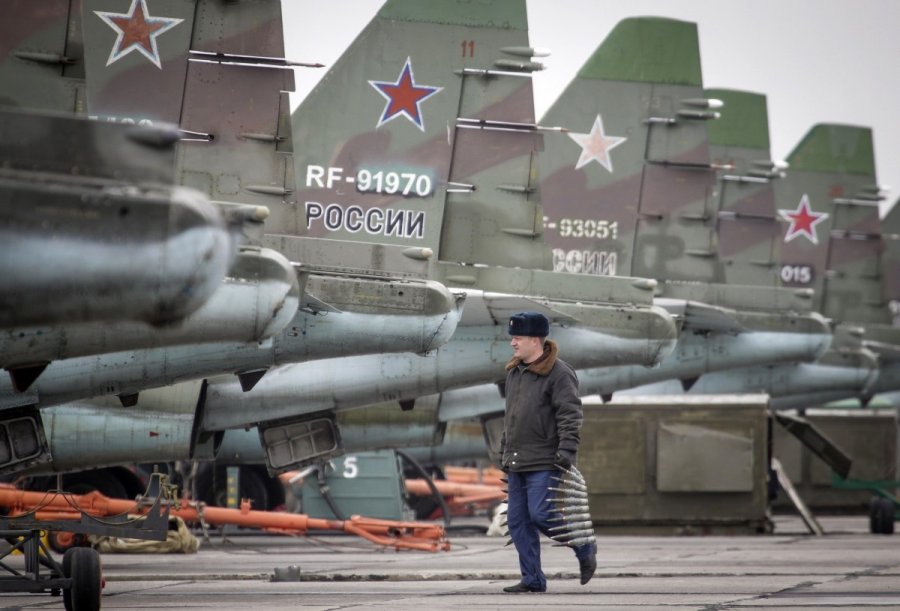
The Obama administration lauds the use of sanctions as a nonviolent method of correcting aggressive countries’ behaviors. Sanctions keep troops out of harm’s way and keep civilians out of the crossfire of combat. Given these significant virtues, sanctions should be the go-to solution for U.S. policy towards any aggressive country – that is, of course, if sanctions actually change country behavior. If they do not, then sanctions are merely a tool used to show disapproval and delay – but not prevent – the accomplishment of that country’s objective. In terms of the Obama administration’s sanctions, either sanctions will convince Iran to stop manufacturing a nuclear weapon and Russia to leave Ukraine, or the sanctions will simply slow the acquisition of an Iranian bomb and the division of Ukraine.
The two main targets of U.S. sanctions – Iran and Russia – are in opposite situations. The sanctions on Iran are easing due to President Hassan Rouhani’s moderate diplomacy, whereas sanctions on Russia may soon grow due to President Vladimir Putin’s belligerent diplomacy. Sanctions on Iran have had time to produce results; sanctions on Russia are in their infancy. Therefore, it is logical to study Iran’s behavior under sanctions to draw conclusions about the effect sanctions will have on Russia’s behavior.
The United States and allies began heavily sanctioning Iran in 2012 in response to Iran’s progress in developing its own nuclear arsenal. The sanctions employed were targeted both on high-level Iranian officials and to the economy as a whole. Since 2011 (the last statistical point of comparison before sanctions), Iranian oil sales dropped 60 percent, oil production fell 30-35 percent, GDP decreased 5 percent, unemployment rose to 20 percent, and inflation jumped to 50-70 percent, according to a Congressional Research Service report. By any economic measurement, the sanctions on Iran dealt a stinging blow. But did they change Iran’s behavior?
To date, Iran has not stopped its nuclear development program. According to the same CRS report, Iran’s centrifuges become more advanced, uranium enrichment program expanded, missile capacity improved, and procurement behavior continued. Furthermore, Iran had enough of an arms excess to supply weapons to forces in Syria, Yemen, Somalia, and Gaza. Only one major change occurred during the sanctions: extremist former president Mahmoud Ahmadinejad’s reign ended with the election of political moderate Hassan Rouhani. Though sanctions have been eased on Iran under Rouhani’s tenure, Iran has taken no concrete steps towards ending its nuclear program other than showing its willingness to discuss the situation with foreign leaders. Though Rouhani’s election was originally hailed as a sanction success story, sanctions on Iran are once again in the news as President Obama recently threatened to veto a bill on implementing new sanctions.
The United States began sanctioning Russia last March, and the sanctions have escalated as Russia’s presence in Ukraine has continued. The initial sanctions only targeted Russian individuals but have broadened into devastating economy-wide policies. The ruble’s value crashed this January to its lowest dollar exchange value ever – 80.1 rubles to the dollar. Food prices, meanwhile, have shot up due in part to a retaliatory food ban imposed by Russia. Thus, U.S. sanctions have a potent and direct implication on daily life in Russia. Nonetheless, the conflict in Ukraine continues. A recent attack by Russian-armed separatists resulted in over 100 wounded and 20 dead, according to a statement by Secretary of State John Kerry.
The precedent set by sanctions on Iran does not bode well for the success of sanctions on Russia. In Iran, sanctions changed regime composition but not regime behavior. Iran is nearing nuclear capacity. Thus far, sanctions on Russia have not altered the behavior of Russia towards Ukraine. Russia is nearing a partition of Ukraine.
However, there is a lens through which these U.S. sanctions can be viewed as successful. Though the sanctions are utter failures in changing the targeted countries’ behaviors, they are successful in providing a low-commitment outlet for U.S. intervention and reassuring U.S. allies that the United States will look out for them. Concerning Iran, the United States must show Israel that it can be trusted as a defense partner and must show the rest of Israel’s neighbors that it is committed to Israel’s defense. However, the United States already has a full plate in the Middle East – countering the rise of ISIS, monitoring the war in Syria, maintaining relations with Egypt and Saudi Arabia, and conducting a drone offensive against terrorist networks in Yemen. Therefore, sanctions allow the United States to show its commitment to Israel without spreading itself thin. Similarly, sanctions allow the United States to show its commitment to NATO without spreading itself thin in Russia’s backyard. In this paradigm, the goal of sanctions is not to change target country behavior but to comfort allies questioning U.S. commitment. Only in this paradigm are sanctions successful. If that is the purpose of U.S. policy in these regions, then it should continue to pursue sanctions. If it wants true change in Iranian and Russian policy, however, it must project force.


